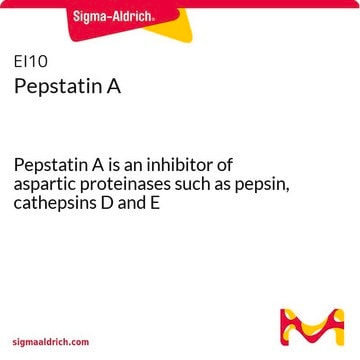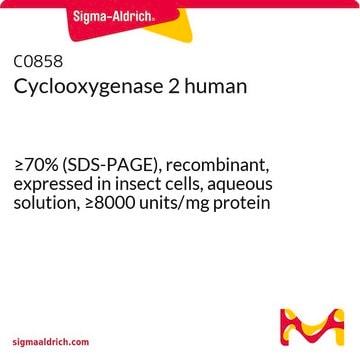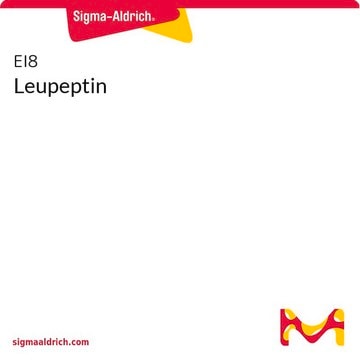516483
Pepstatin A, Penetratin
A Pepstatin A that is ~75% less potent against Cathespins D/E than PepA in cell-free assays.
Synonym(s):
Pepstatin A, Penetratin, PepA-RQIKIWFQNRRMKWKK-OH, PepA-Antp₄₃₋₅₈
Sign Into View Organizational & Contract Pricing
All Photos(2)
About This Item
Empirical Formula (Hill Notation):
C138H229N39O28S
Molecular Weight:
2914.60
UNSPSC Code:
12352202
NACRES:
NA.77
Recommended Products
Quality Level
Assay
≥97% (HPLC)
form
lyophilized solid
manufacturer/tradename
Calbiochem®
storage condition
OK to freeze
desiccated (hygroscopic)
protect from light
color
white
solubility
water: 1 mg/mL
shipped in
wet ice
storage temp.
−20°C
General description
A Pepstatin A (PepA; Cat. No. 516481) penetratin (pAntp43-58) conjugate (PepA-P) that is ~75% less potent against Cathespins D/E (IC50 = 920 nM) than PepA in cell-free assays, presumably due to its decreased solubility. However, with its enhanced permeability, PepA-P is much more active than PepA in inhibiting cellular aspartic protease activity in MCF7 (94.1% vs. 54.6% inhibition wtih 10 µM respective compound), Boleths, and Dendritic cultures. PepA-P, but not PepA, effectively interferes with antigen processing by primary APCs and the subsequent activation of antigen-specific memory T cells.
Packaging
Packaged under inert gas
Warning
Toxicity: Standard Handling (A)
Sequence
PepA-Arg-Gln-Ile-Lys-Ile-Trp-Phe-Gln-Asn-Arg-Arg-Met-Lys-Trp-Lys-Lys-CO₂H
Physical form
Supplied as a trifluoroacetate salt.
Reconstitution
Following reconstitution, aliquot and freeze (-20°C). Stock solutions are stable for up to 3 months at -20°C.
Other Notes
Zaidi, N., et al. 2007. Biochem. Biophys. Res. Commun.364, 243.
Legal Information
CALBIOCHEM is a registered trademark of Merck KGaA, Darmstadt, Germany
Storage Class Code
11 - Combustible Solids
WGK
WGK 1
Flash Point(F)
Not applicable
Flash Point(C)
Not applicable
Certificates of Analysis (COA)
Search for Certificates of Analysis (COA) by entering the products Lot/Batch Number. Lot and Batch Numbers can be found on a product’s label following the words ‘Lot’ or ‘Batch’.
Already Own This Product?
Find documentation for the products that you have recently purchased in the Document Library.
Adrienn Skopál et al.
The Journal of biological chemistry, 298(5), 101888-101888 (2022-04-04)
Adenosine A2A receptor (A2AR)-dependent signaling in macrophages plays a key role in the regulation of inflammation. However, the processes regulating A2AR targeting to the cell surface and degradation in macrophages are incompletely understood. For example, the C-terminal domain of the
Our team of scientists has experience in all areas of research including Life Science, Material Science, Chemical Synthesis, Chromatography, Analytical and many others.
Contact Technical Service








